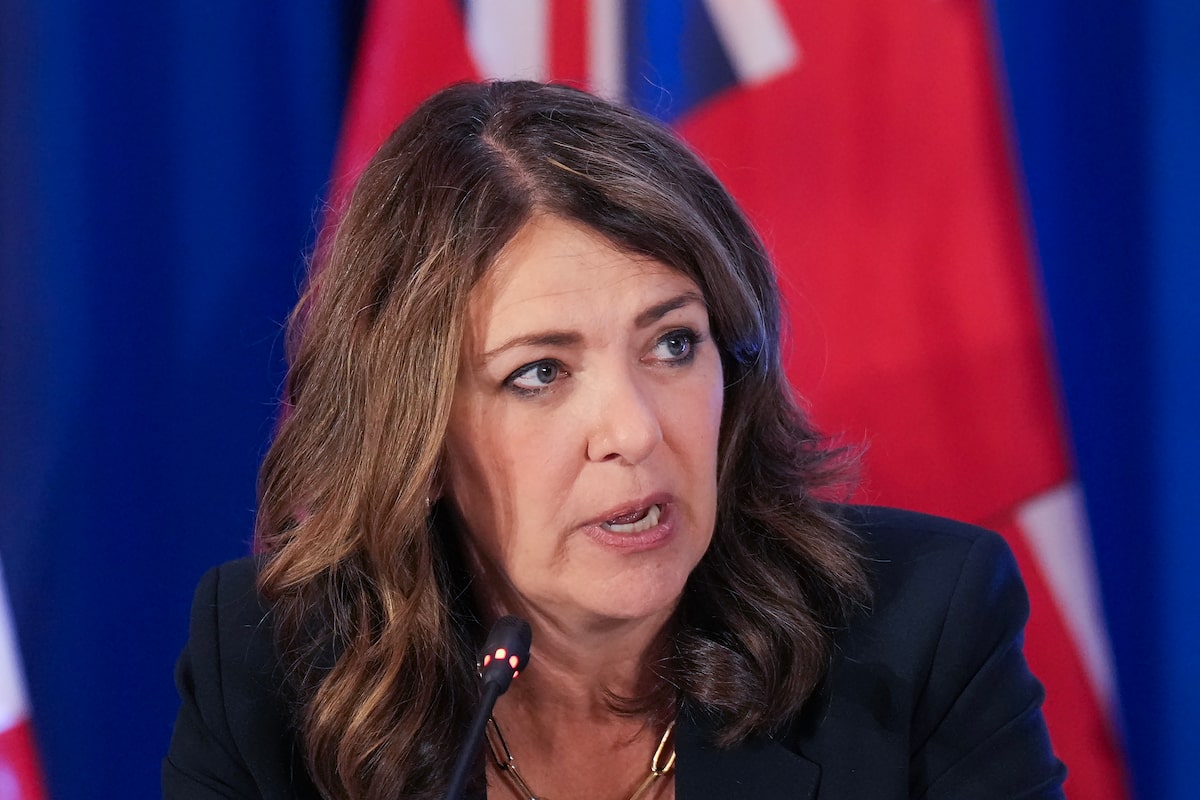Alberta Premier Danielle Smith said non-citizens will have no notation on their driver’s licences.Nathan Denette/The Canadian Press
Alberta Premier Danielle Smith says her government is adding proof of citizenship markers to driver’s licences and other forms of identification to streamline services and prevent election fraud.
Smith told reporters in Calgary the change would make it easier for students and the disabled to get funding, as they already have to prove Canadian citizenship to do so.
“We believe in making things better, faster and more convenient for everyone,” Smith said Monday.
“By including citizenship information on these cards, we’re streamlining access to vital services, whether applying for student aid, accessing health benefits or supporting those with disabilities.”
Another goal, she said, is to protect democracy to make sure only Canadian citizens vote in Alberta.
“This helps safeguard the integrity of our electoral process and strengthens trust in our democracy,” said Smith.
The citizenship marker is to appear as “CAN” on identification.
Smith said non-Canadian citizens, including permanent residents, would not have any new notation on their IDs.
She said the move would be a first in Canada, although other provinces, including Ontario, have had special driver’s licences with citizenship markers for the sole purpose of U.S. border crossings.
The change comes as Smith’s hand-picked Alberta Next panel continues its tour of the province seeking support for measures meant to push back against federal policies and programs. One proposal is for Alberta to create its own provincial immigration system and withhold social services from newcomers who aren’t approved.
Smith was asked Monday if adding citizenship markers to ID cards is a first step in creating that program or if it would make it easier to deny services to some immigrants.
Smith said the change to ID is meant to solve separate issues.
“If there are other ways that we would apply it, I guess we’ll have to see on a future-going-forward basis,” she said.
Alberta health care numbers are also to be added to driver’s licences.
Smith said the province has registered just over 530,000 more Alberta health care numbers than there are people in the province and adding the numbers to driver’s licences should help determine which are “outliers.”
Service Alberta Minister Dale Nally, speaking with Smith on Monday, initially described the unaccounted-for numbers as fake and “opened the door for abuses.” But Smith characterized the extra numbers as having “unknown status.”
When asked which explanation was correct, Nally said: “We don’t know.”
“When you lack security features and you lack integrity in the cards, like we do now, you don’t know,” he said. “The reality is we don’t know, and that’s why it’s so imperative that we do this.”
Nally said adding citizenship markers and health care numbers to driver’s licences and other forms of ID won’t lead to discrimination.
“This is pure and simple about putting citizenship on driver’s licences to make it easier when applying for benefits or citizenship entitlements.”
Opposition NDP immigration critic Lizette Tejada said in a statement that it wasn’t clear why the citizenship marker is necessary, and questioned the intent of the changes by pointing back to the proposal the Premier’s panel is workshopping.
Tejada also said she thought the changes would only lead to headaches when people go to renew their licences, as Albertan’s will need to prove their citizenship in order to do so.
“Once again, this government engages in virtue signaling while creating bureaucracy and red tape for everyone,” she said.
Some federal politicians also questioned the government’s move on Monday.
Daniel Bernhard, the chief executive officer of the Institute for Canadian Citizenship, said he didn’t understand what problems adding citizenship markers to driver’s licences or other ID cards would solve.
“Putting your citizenship status on a driver licence seems to do little more than tell police officers whether you are a citizen in the event that you get pulled over,” said Bernhard, whose Toronto-based organization supports newcomers and studies immigration policy.
“It seems like a questionable move, to say the least.”
Bernhard also questioned if Alberta will be adding citizenship to all forms of identification that are accepted at the polls – such as library cards, boating licences or marriage certificates – if the goal is to limit voter fraud.
Nally’s press secretary, Brandon Aboultaif, did not immediately respond to questions asking for confirmation.
Regardless of the answer, Bernhard said having the citizenship marker on some identification cards will be an unnecessary privacy issue.
“Things that have nothing to do with citizenship status will suddenly be infused with this discriminating mark of citizenship,” he said, giving the example of purchasing alcohol.
Legislation is to be put forward this fall to make the change, which the government said would come into effect next year.
Nally said the change is part of a “complete redesign” for licences and ID cards and more information would be announced at a later date.

